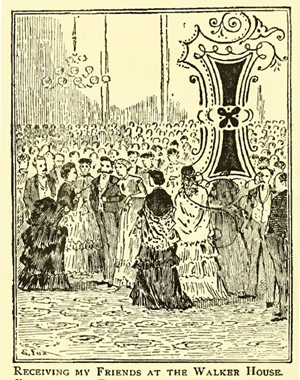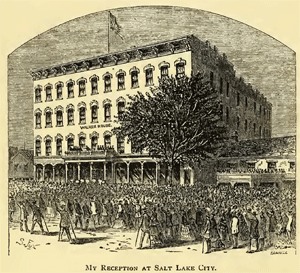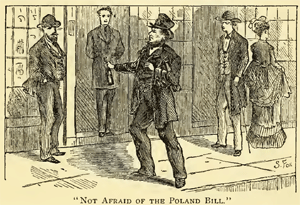I Return to Utah. Reception at the Walker House. Greeting old Friends. My Love for the Place. Six Lectures in the Territory. Brigham's Daughters make Faces at me. My Father and Mother in the Audience. The Half not told. Multitudes Pleading for Freedom. Eastern Newspaper Reports. Indiscretion. The Poland Bill. Increase of Polygamy. The Secrets of Brigham's Power. The Pulpit and Press on Mormonism. The Salt Lake City Tribune. A Word to the Sufferers. Calls for Help. The Future of Utah.

Receiving my Friends at the Walker House.
IN August, 1874, I returned to Salt Lake City; but not in the secret way in which I had left it months before. I was met with every expression of good will, and congratulations and welcomes poured in upon me from every side. A reception was held for me at the Walker House, and I had the opportunity of greeting again the friends who had so nobly assisted me in my struggles for freedom. Foremost of all, Judge McKean, the truest, most upright, and inflexible chief justice who had ever presided over the Utah courts; the man who could neither be bribed nor cajoled; who did right for the right's sake, and who consequently had gained the enmity of Brigham Young and his followers, but who was implicitly trusted by all lovers of justice; General Maxwell, too, who was so kindly acting for me in my suit; Colonel Wickizer, who lent his room for my trunk to be taken to, and otherwise assisted me in my flight from Utah; and Mr. and Mrs. Stratton, the dearly beloved friends who had first shown me the possibilities of an escape from bondage and a life outside.

My Reception at Salt Lake City.
This welcome, hearty and spontaneous, touched me deeply, and I felt then that however much my interests might be drawn away from Salt Lake City, and my work lead me away from there personally, yet it was my home, its people were my people, and my heart would always turn lovingly toward it to the day of my death.
And why should I not love it? I had grown with it, and there is not a building in it that I have not watched as it arose, not an improvement that I have not rejoiced in. I have seen a lovely city spring up in an alkali desert as if by magic. True, I have suffered there. Many of its associations are bitter. But that is the city as it has been the Salt Lake of the past, not the Salt Lake of the future, as I hope its future will be.
During the summer, I lectured six times in the city, and several times in other towns in the Territory. Brigham did not attend any of my lectures, but he sent his daughters and daughters-in-law, and bade them sit on the front seats, and make faces at me. They filled the two rows nearest the platform, and, as I saw them there, my heart went out in pity toward them. I knew all of them; many of them had been my dear friends from girlhood, and I had known how unhappy they had been under the cruel system which I was fighting against. I had been in the confidence of several, and more than one had commiserated me upon my unhappy situation while I was their father's wife. Instead of annoying me, and causing me to falter and break down completely, as the prophet hoped, it only lent new strength to my purpose, new fire to my words. I knew that these women sympathized with me in every word I uttered, and that in their hearts they earnestly wished me success.
My father and mother were in my audience, too. It had required a great deal of persuasion to induce the latter to be present, but she finally yielded to us all, and went. Long before this she had lost her faith in Mormonism, and was ranked among the apostates. Brigham's attempts to ruin me had opened her eyes, and she at last saw him as he really was. I think no one rejoiced in my success more than she did, and certainly no one else has had power to imbue me with such fresh courage and strength. And now that she has abandoned Mormonism, when I think of her, away from all the old associations, united in her old age to the friends of her childhood, happy in a home safe from the intrusion of polygamy, every shade of bigotry blotted out, her reason unfettered, her will free, I am happier than I ever can say; and if this result only were reached in the cases of the other women of the Territory, I should feel that my suffering and my labors had not been in vain.
Next to these lectures in Salt Lake, my most successful appearance was made at Provo, where I spoke under the auspices of the Rev. C. P. Lyford, the pastor of the Methodist church in that place, and one of the most inveterate foes of Polygamy and Brigham Young. Three years ago Provo was one of the most powerful of all the Mormon strongholds in Utah. Many deeds of violence had been committed there, and bigotry in its worst form ruled the people. Mr. Lyford, young, brave, and enthusiastic, determined to build a Gentile church there. He went into the work cheerfully and determinedly, although he was warned to leave the county, his life threatened, and every possible insult and indignity offered him. But he could not be intimidated, and flatly refused to leave; and now he has a society fully organized, a church built, and a free school established. He has been one of my strongest allies and warmest defenders, and I owe to no one more gratitude than to him.
I have told my story as simply as I could. I have added nothing, but I have left much untold. Another volume, as large as this, would not contain all I could write on this subject. My life is but the life of one; while thousands are suffering, as I suffered, and are powerless even to plead for themselves, so I plead for them. The voices of twenty thousand women speak in mine, begging for freedom both from social and religious tyranny.
I take up papers, and I read letters from eastern correspondents who have visited Utah; and while I do not wonder at the enthusiasm which they display concerning the outward beauty of this city of the desert, I marvel at the blindness which fails to see the misery of the majority of its people. "Polygamy is on the decrease," they almost unanimously exclaim; "the ballot and education are its foes, and it cannot stand before them; the young people will not enter the system, and while polygamous marriages diminish in number, monogamic ones steadily increase."
This is not so. I have no doubt it is the story which is told to these strangers by Mormons. But that is an old trick. They have been accustomed, in other days, to repudiate polygamy while practising it most extensively. They are only following "Brother Joseph's" example. He denied it, to save the reputation of himself and his followers; and they do it still, when they wish to blind the Gentiles' eyes, and escape their criticism.
Last year, as the records will show, there were more polygamous marriages in Utah than there have been any previous year since the "Reformation." The Order of Enoch and Polygamy are, to-day, Brigham's two strongest holds on the people. By the first, he holds the men through sheer necessity; for all who have entered the Order have given themselves and their possessions so entirely to him, that they cannot, by any possibility, get free. By the other system, he holds the women in a crueller bondage still. He and Cannon may repudiate the "Celestial Marriage" as strongly as they choose, but they cannot change the facts. They are more shrewd, but not so honest as the fellow who was seen reeling through the streets of Salt Lake City, with a bottle under each arm, shouting, "I've taken a new wife to-day, and I'm not afraid of the Poland Bill." They do care for "the Poland Bill," or, rather, they care about public opinion very much, and they like the positions which they might be obliged to resign if they ventured to claim the legality of Polygamy.
There is a strong working-power against it in its very midst, however, and it seems to me that it is a power which must prevail. The pulpit and press combined are dealing some heavy blows upon it, and it cannot always stand under it. Instead of the Mormon church being the only church in Utah, nearly every denomination is represented there now, and the most of these churches have schools connected with them, -- such superior schools, some of them, that a few of the more liberal and intelligent Mormons venture to send their children to them.

"Not Afraid of the Poland Bill."
But the strongest power in the Territory against Polygamy, -- the most implacable and relentless foe to Brigham Young and his pet institution, -- is the Salt Lake City Tribune, the leading Gentile paper in Utah. It is owned by a stock company, composed of the leading Gentiles in the Territory; is ably conducted, and is hated and dreaded by the Mormons, although they all read it. It has been my constant friend, and has stood bravely by me ever since I turned my back on my false faith, and sought shelter and friends in "Babylon."
It is a power in politics. When Governor Woods -- although a loyal and brave officer of the government -- was removed to make place for Axtell, who was a mere tool in the Prophet's hands, the indignant utterances of the paper made themselves felt all over the country; and the supporters of the new governor in Washington grew ashamed, and he was removed to make room for Governor Emory, the present governor, who, as yet, has shown no disposition to assimilate with the saintly portion of his subjects.
Now, as I approach the end of my story, I turn longing eyes toward my old home, and my heart goes out in pitying tenderness to it and the women there. To them I want to say, Your cause is my cause, your wrongs have been my wrongs; and while you are still bearing them patiently, because you know there is no redress; hopelessly, because while your hearts are breaking, you see no avenue of escape, I am trying the best I know to make the way easy and plain to your eyes, dimmed with tears, and your feet, tired of wandering in broken paths. Many of you, I know, think that I am wrong; you believe, as I once did, that to fight against Brigham Young, and his will, is certain damnation. You mourn for me as one lost; you regard me with pity; but yet, in your hearts, you wish to believe that I am right; you would like to be convinced that I am. Some of you are certain of it, but you do not see your own way out. The darkness closes around you thicker and heavier, and, tired of groping about, you fold your hands and sit in an apathy worse than death, waiting until the dawn of eternity shall throw light upon your path. God help you, sisters, one and all, and bring you out of the spiritual bondage in which you are held.
And you, happier women, -- you to whom life has given of its best, and has crowned royally, -- can you not help me? The cry of my suffering and sorrowing sisters sweeps over the broad prairies, and asks you, as I ask you now, "Can you do nothing for us?" Women's pens, and women's voices pleaded earnestly and pathetically for the abolition of slavery. Thousands of women, some of them your country-women, and your social and intellectual equals, are held in a more revolting slavery to-day. Something must be done for them. This system that blights every woman's life who enters it, ought not to remain a curse and a stain upon this nation any longer. It should be blotted out so completely that even its foul memory would die.
Yet, how is it to be done? I confess myself discouraged when I ask that question. Legislation will do no good, unless the laws can be enforced after they are once made. But if laws are to be framed, and the men who enforce them are to be removed as a punishment for their faithfulness, they are better not made.
But one thing is certain. If one voice, or one pen, can exert any influence, the pen will never be laid aside, the voice never be silenced. I have given myself to this work, and I have promised before God never to withdraw from it. It is my life-mission; and I have faith to believe that my work will not be in vain, and that I shall live to see the foul curse removed, and Utah -- my beloved Utah -- free from the unholy rule of the religious tyrant, -- Brigham Young.
THE END.
